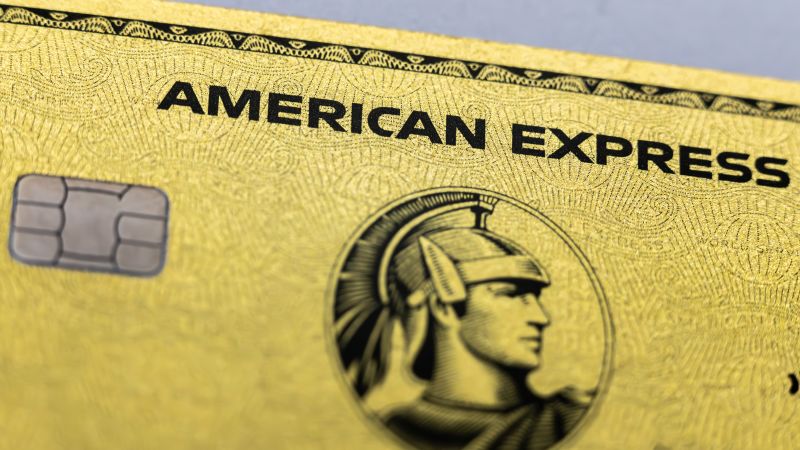Here’s Why Elite Credit Cards Are Fighting for Affluent Shoppers

The Americans are feel gloomy on the economy. Yet despite the headwinds, high earners continue to spend like crazy – and credit card companies are offering more and more perks to lure them.
But some experts worry that these extra rewards for the rich will increase costs for everyone else, from merchants to customers.
“Credit card companies are working to serve more and more affluent customers,” said Doug Kantor, general counsel for the trade group National Association of Convenience Stores (NACS). These companies are “trying to get more rewards (for top earners) at the expense of everyone else, by pushing those costs onto everyone else.”
This year, both American Express And JPMorgan Chase added luxury perks to their best rewards cards. For example, the Amex Platinum card now offers a $200 credit toward an Oura ring, while the Chase Sapphire Reserve offers up to $500 credit toward high-end hotels; both cards enjoy many other benefits, such as access to airport lounges. These new benefits came with higher annual fees, with the Platinum card now $895 and the Sapphire Reserve $795.
However, annual fees are only part of how credit card companies offer cardholders what they advertise as thousands of dollars in savings.
These rewards are also funded by the fees that credit card companies charge merchants each time. any the customer pays with a card. These so-called swipe fees often include things like interchange, processing, and other fees that merchants must pay to credit card companies to accept their cards.
The U.S. market has the highest rates compared to the rest of the world, “and that’s what’s used to fund these very rich rewards,” said Brian Riley, director of credit advisory services at Javelin Strategy & Research.
So as the wealthy have relied on credit cards offering greater rewards, the price merchants pay to accept them has also increased, forcing merchants to choose between lower profits or higher own prices.
This is why even cash payers end up contributing to these elite card rewards. Joanna Stavins, senior economist and policy advisor at the Federal Reserve Bank of Boston, discovered in herself research that those who pay by cash and debit are effectively “subsidizing” credit card users by paying the same prices without reaping the rewards.
“It’s definitely high-income consumers who are most likely to benefit,” Stavins said.
There is a growing divergence in spending between high- and low-income households. In September, credit and debit card spending among high-income households grew more than four times faster than that of low-income households, according to data from the Bank of America Institute.
“There is a gap, and the gap is growing,” said David Tinsley, senior economist at the Bank of America Institute.
Almost half of consumer spending in the United States comes from those with incomes in the top 10% – the highest percentage since at least 1989. And although most low- and middle-income earners prefer to pay with cash or debit cards, a majority (51%) of households earning more than $150,000 per year prefer credit cards, according to 2025 Federal Reserve findings.
As credit card usage increases, acceptance fees for merchants also increase. Since the start of the Covid-19 pandemic, these swipe fees have increased by almost 70%, according to NACS, which cites Nilson data.
To combat this, NACS has pushed for legislation to promote competition and allow merchants to choose less expensive credit card payment networks. Although he gathered key supporters when the law was introduced in 2023, like today-Vice President JD Vancethe legislation has not progressed and observers see little chance of it becoming law in the near term.
Riley of Javelin Strategy & Research said that without such legislation, credit card issuers have doubled down on premium cards that often charge high annual fees to consumers and higher fees to merchants to accept them — a lucrative business model in an economy where high earners see the fastest growth in spending and wages.
AmEx has not commented on this story, but their fees page says they offer merchants “simplified options” for accepting their cards. The company also offers lower rates to certain merchants based on their business type, transaction amount, and whether or not they are in an emerging market.
Chase told CNN that while the Sapphire Reserve Card is designed for “affluent customers who deeply value travel, dining and experiences,” the company offers several types of credit cards for different types of customers.
Some experts say these swipe fees are necessary for merchants to maintain the benefits of card acceptance.
Todd Zywicki, a law professor at George Mason University, spoke out against proposals to cap payment fees, arguing that the growing use of credit cards has benefited merchants and consumers alike, by giving businesses the flexibility to make purchases without the need for cash and providing consumers with access to credit.
He noted that swipe fees also support services like fraud prevention, which prevent customers from paying fees when their card is stolen.
And, he added, merchants can certainly choose to decline card payments if the cost of accepting them is too high.
“They want the benefits of accepting credit cards without the cost,” he said.
However, some research shows that the divide may not simply be between the rich and the poor, but rather that the benefits of these cards benefit those with high credit scores, to the detriment of those with low credit scores.
A study published by the International Monetary Fund which looked only at credit card users, found that those with high credit scores – including those with low incomes – benefited from using rewards cards. According to the researchers, consumers with high incomes and high credit scores gained the most, while high incomes and low credit scores ended up losing more than any other group.
CNN’s Auzinea Bacon contributed reporting.
ـــــــــــــــــــــــــــــــــــــــــــــــــــــــــــــــــــــــــــــــــــــــــــــــــــــــــــــــــ
Soon, there will be articles covering various topics, such as:
Insurance, Loans, Mortgage, Attorney, Credit, Lawyer, Donate, Degree, Hosting, Claim, Conference Call, Trading, Software, Recovery, Transfer, Gas/Electicity, Classes, Rehab, Treatment, Cord Blood, Best mesothelioma lawyer, Truck accident lawyer, Buy life insurance online, Business VoIP provider, EMR software for clinics, Structured settlement companies, motorcycle injury lawyer, motorcycle injury attorney, spinal cord injury attorney, birth injury attorney, auto accident injury attorney, spinal cord injury lawyer, car injury attorney, motorcycle accident injury attorney, catastrophic injury lawyer, birth injury lawyer, workplace injury attorney, motorcycle injury attorneys, head injury lawyer, personal injury attorneys, traumatic brain injury attorney, train accident lawyer, brain injury attorney, auto injury attorney, serious injury attorney, personal injury lawyer, truck injury lawyer, injury attorneys, back injury lawyer, injury lawyer near me, injury lawyer,
If you would like to see these articles, please write so in the comments.




